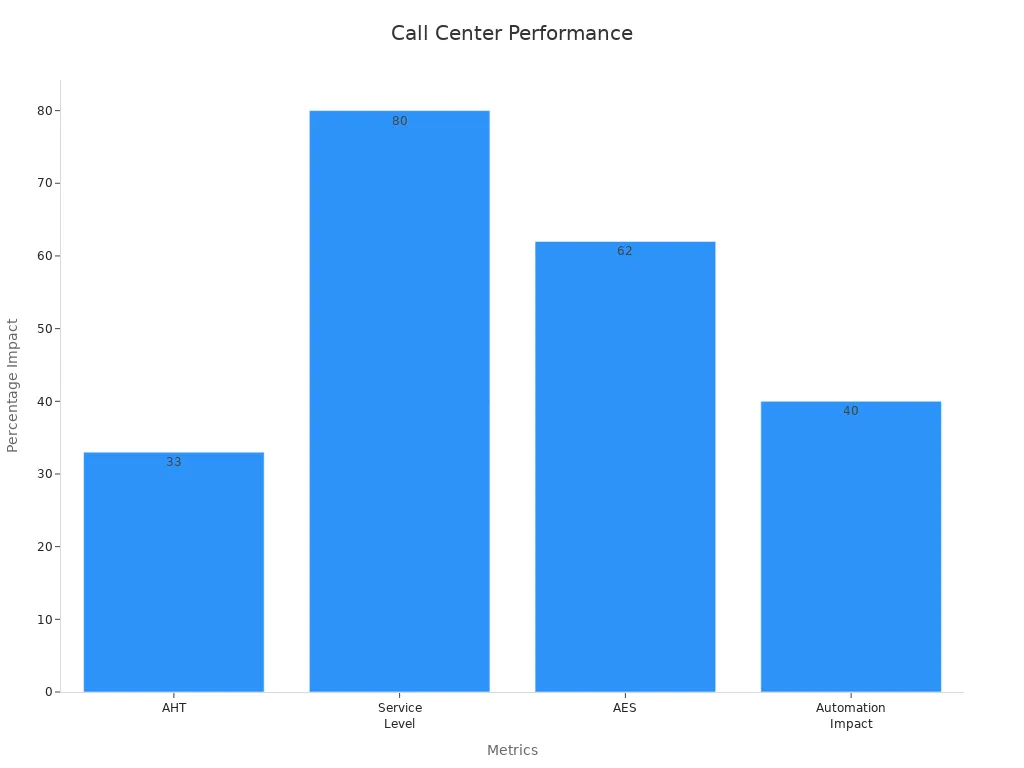Proven Methods to Optimize Call Center Agent Scripts

When you optimize a call center agent script, you help your team deliver a better customer experience and raise agent performance. Clear and flexible scripts let agents connect with every customer, which leads to higher customer satisfaction and stronger customer service excellence. Many companies see customer satisfaction scores rise by 20% after improving their scripts. With tools like Sobot AI and Sobot’s Voice/Call Center, you give your agents real-time support and make each customer interaction smoother. Technology and ongoing training shape every customer experience and satisfaction.
Effective Call Center Scripts

Key Qualities
When you build effective call center scripts, you set your team up for success. The best scripts share a few key qualities. They are clear, easy to follow, and flexible. You want your script to guide agents but not box them in. This balance helps agents handle different customer interactions with confidence.
Leading companies use AI-powered tools to monitor calls and measure script quality. For example, real-time analytics can show how well agents stick to the script and where they can improve. One multinational company improved its quality assurance scores from 60% to 88% after using targeted coaching based on these analytics. This led to higher customer satisfaction and saved over $30 million. These results show that when you focus on script quality and use the right practices, you boost both agent performance and customer satisfaction.
Tip: Track key performance indicators (KPIs) like connection rate, conversion rate, and cost per lead. These numbers help you see if your call center scripts are working.
Clarity and Empathy
Clarity and empathy make your call center scripts stand out. When your script uses simple language, customers understand you better. Clear scripts help agents avoid confusion and keep calls on track. Empathy, on the other hand, builds trust and makes customers feel valued.
Did you know that 76% of employees who feel empathy from their leaders report higher engagement? This shows how important empathy is in every customer interaction. Poor customer service costs U.S. companies $75 billion each year. That’s a huge loss that you can avoid by making empathy part of your script. When you combine clarity and empathy, you improve the customer experience and raise satisfaction scores.
- Use short sentences and positive language.
- Add phrases that show you care, like “I understand how you feel.”
- Make sure your script gives agents room to listen and respond with empathy.
Adaptability
You need adaptable call center scripts to handle real-world situations. Customers come with different needs, moods, and questions. A rigid script can frustrate both agents and customers. Adaptable scripts let agents adjust their approach while staying on message.
Sobot’s Voice/Call Center gives your team tools to adapt scripts in real time. With features like a unified workspace and intelligent IVR, agents can switch between languages, update information, and handle complex requests without missing a beat. This flexibility leads to faster resolutions and higher customer satisfaction.
- Allow agents to personalize greetings and responses.
- Update scripts based on feedback and analytics.
- Use digital platforms to embed scripts and standard operating procedures, so agents always have the latest version.
Note: Live and recorded call monitoring helps you see where scripts need more flexibility. You can then coach agents and fine-tune your practices for better results.
Writing a Call Center Agent Script
Structure and Simplicity
When you start building a call center agent script, focus on structure and simplicity. A good script acts like a roadmap. It guides agents step by step, so they never feel lost during a call. Simple call center scripts help agents answer questions quickly and avoid confusion. You want every script to include clear greetings, key phrases for common issues, and easy closing statements.
- Well-structured call center scripts reduce average handle time by up to 25%. For example, Bupa saw faster resolutions and happier customers after updating their scripts and training.
- Scripts that use decision trees or step-by-step flows make troubleshooting easier. Imagine an internet provider’s script that checks for outages, then router power, then cables. This keeps calls smooth and short.
Tip: Regularly update your call center scripts based on feedback and analytics. This keeps them fresh and effective.
Personalization
Personalization makes your call center scripts feel human. You can add the customer’s name, reference their history, or adjust your tone to match their mood. Personalized scripts boost engagement and satisfaction. Metrics like first call resolution and customer satisfaction scores often improve when you personalize scripts.
- Use customer surveys and call analytics to see what works best.
- Speech analytics tools can help you spot emotional cues and adjust scripts for better engagement.
Sobot’s unified workspace lets agents see customer info in real time, making it easy to personalize every call. When you combine personalization with strong script practices, you create memorable customer experiences.
Compliance
Compliance is a must for all call center scripts. You need to follow rules like TCPA, PCI DSS, and the Do Not Call Registry. Non-compliance can lead to huge fines—sometimes millions of dollars. Here’s a quick look at some key regulations:
| Regulation | Description | Benefit |
|---|---|---|
| TCPA | Controls telemarketing calls | Avoids lawsuits |
| PCI DSS | Protects payment data | Builds trust |
| DNC Registry | Blocks calls to listed numbers | Reduces complaints |
Make sure your script includes required disclosures and follows all legal practices. Sobot’s AI-powered monitoring tools help you stay compliant by tracking every call and alerting you to risks. This keeps your call center scripts safe and your business reputation strong.
Training for Script Performance
Role-Playing
Role-playing is one of the best ways to boost your agent training. When you practice real-life calls with your team, you help everyone build confidence and improve their skills. Studies show that role-playing increases empathy, teamwork, and communication. In fact, over 95% of trainees say they feel more satisfied with their training when they use role-playing. You get a safe place to make mistakes and learn from them. This method also helps you apply what you learn in class to real calls. You see faster skill growth and better performance. Many call center training programs use role-playing because it works. You can even use Sobot’s unified workspace to set up scenarios and track feedback from each session.
- Role-playing helps you:
- Practice scripts in a low-risk setting
- Build empathy and confidence
- Improve teamwork and communication
- Get instant feedback from peers and trainers
Tip: After each role-play, ask for feedback from your team. This helps you spot areas to improve and keeps your agent training on track.
Active Listening
Active listening is a key part of agent training. When you listen closely to your customers, you solve problems faster and make them feel heard. Research backs this up. For example, active listening training raised confidence in listening skills for students and improved communication ratings for law enforcement negotiators. In sales, customers gave higher ratings to agents who used active listening. Here’s a quick look at some results:
| Context | Outcome |
|---|---|
| Education students | Higher confidence in listening |
| Crisis negotiators | Better communication skill ratings |
| Sales professionals | Higher customer ratings |
| Helpline volunteers | Improved supervisor skill ratings |
You can use Sobot’s call analytics to review calls and get feedback on your listening skills. This makes your customer service training more effective and helps you spot ways to improve.
Flexibility
Flexibility in agent training means you can handle any situation. Scripts give you a guide, but real calls often go off-script. You need to adapt and think on your feet. Sobot’s Voice/Call Center lets you update scripts quickly and gives agents real-time feedback. This helps you adjust your approach based on customer needs and feedback. Flexible training also means you learn from every call. You can use feedback from supervisors, customers, and analytics to keep getting better. When you stay flexible, you improve your performance and deliver better service.
- Ways to build flexibility:
- Practice different scenarios in call center training
- Use feedback to update your approach
- Encourage agents to share what works in team meetings
Note: The best agent training programs always include feedback and flexibility. This keeps your team ready for anything.
Script Flexibility in Sobot Voice/Call Center
Empowering Agents

You want your agents to feel confident and ready for any customer call. Sobot’s Voice/Call Center gives you tools that make this possible. With flexible IVR, agents can route calls to the right person or team in seconds. The unified workspace puts all customer information in one place, so agents never have to switch screens or guess what the customer needs. Multilingual support lets your team help customers in their own language, which builds trust and makes every interaction smoother.
- Flexible call center scripts let agents:
- Personalize each conversation
- Get real-time guidance on the next best action
- Adjust their approach based on customer mood or need
- Use automated scoring to see how they are doing after every call
When you give agents the freedom to adapt scripts, you see higher customer satisfaction and faster problem-solving. Agents who can connect with customers in a real way feel more engaged and perform better.
Real-World Scenarios
Let’s look at how script flexibility works in real life. Weee!, America’s largest online Asian supermarket, used Sobot’s Voice/Call Center to solve big challenges. Their old system made it hard to help customers in different languages or time zones. After switching to Sobot, Weee! saw a 20% jump in agent efficiency and cut resolution time by half. Customer satisfaction soared to 96%. Flexible scripts, a smart IVR, and a unified workspace helped agents handle every customer request with ease.
When you empower agents with flexible scripts and the right tools, you create better customer engagement and happier customers.
Positive Scripting
Positive scripting means using words that make customers feel heard and valued. Sobot’s call center scripts encourage agents to use empathy phrases like “I understand how you feel” or “Let me help you with that.” Agents can adjust these phrases to fit the customer’s mood, which makes the conversation feel natural. This approach helps agents avoid sounding robotic and builds real connections.
| Script Feature | Benefit for Customer |
|---|---|
| Empathy phrases | Builds trust |
| Personalization | Makes customers feel special |
| Real-time updates | Solves problems faster |
When you combine script customization with ongoing training, your team delivers service that stands out. Customers notice when agents care, and your satisfaction scores will show it.
Technology for Call Center Scripts

AI and Analytics
You can boost your call center’s results with AI and analytics. These tools help you see what works and what needs improvement. For example, speech analytics uses AI to listen to calls and spot trends. It checks if agents follow the script and finds places where they can do better. With Sobot’s AI-powered Voicebot and call analytics, you get real-time insights into every call. This means you can track agent strengths, spot weaknesses, and give targeted training. Studies show that 72% of businesses see better service with voice analytics. When you use these tools, you can monitor 100% of your calls, not just a small sample. This leads to higher customer satisfaction and more accurate scripts. You also see a big jump in performance improvement because you know exactly where to focus your efforts.
Real-Time Guidance
Real-time guidance gives your agents help while they talk to customers. Sobot’s unified workspace lets you see customer info, call history, and helpful prompts all in one place. AI-powered tools can suggest the next best thing to say or do. This support helps agents stick to the script and handle tough questions. Real-time performance feedback means you can coach agents right away. You can use silent monitoring or call whispering to give tips during live calls. Companies that use real-time guidance see better CSAT scores, faster first call resolution, and shorter handle times. For example, one company improved its Net Promoter Score by 220% after using real-time coaching. These tools make every call a chance for learning and improvement.
- Real-time tools help you:
- Give instant feedback to agents
- Spot training needs quickly
- Improve customer experience on every call
Continuous Improvement
You should always look for ways to make your scripts better. Technology makes this easy. With Sobot’s analytics, you can review calls, see what works, and update scripts based on real data. Real-time audits show where agents follow the script and where they need more training. This cycle of feedback and updates leads to ongoing improvement. You can spot gaps, adjust your training, and keep your team sharp. When you update scripts often, you keep up with customer needs and industry changes. This approach helps you build trust and loyalty with your customers.
Tip: Make script updates a regular part of your process. Use data and feedback from every call to guide your next improvement.
Measuring Script Performance
KPIs and Metrics
You can’t improve what you don’t measure. That’s why tracking the right KPIs helps you see how well your call center scripts work. When you focus on these numbers, you spot trends and make smart changes. Here’s a table with some of the most important metrics for customer service interactions:
| KPI Name | Description | Formula / Measurement Approach | Why It Matters for Scripts |
|---|---|---|---|
| Average Speed of Answer | How fast agents answer calls | Total wait time / Total answered calls | Faster answers mean better customer experience and script efficiency |
| Average Handle Time | Time spent on each call, including talk and after-call work | (Talk + Hold + After Call Work) / Total Calls | Good scripts help agents resolve issues quickly, lowering this number |
| Cost Per Call | Average cost for each call | Total Cost / Total Calls | Efficient scripts lower costs |
| Service Level | % of calls answered within a set time | (Calls Answered in X seconds / Total Inbound Calls) x 100 | Shows if scripts help agents respond on time |
| Call Abandonment Rate | % of callers who hang up before speaking to an agent | (Abandoned Calls / Total Call Attempts) x 100 | Lower rates mean customers get help faster |
| Net Promoter Score (NPS) | Customer loyalty and satisfaction | % Promoters - % Detractors | Higher scores show scripts improve customer loyalty |
When you use Sobot’s analytics, you can track these KPIs in real time and see how script changes affect resolution and satisfaction.
Agent and Customer Feedback
Feedback is your secret weapon for better scripts. Ask your agents what works and what feels awkward. Listen to your customers, too. They’ll tell you if your scripts sound robotic or if they help solve problems. You can collect feedback through surveys, call reviews, or even quick chats after calls. Sobot’s unified workspace makes it easy to gather and review this feedback. When you act on what you learn, you boost first call resolutions and make every customer interaction smoother.
Tip: Use both positive and negative feedback to guide your next script update. Sometimes, a small change leads to a big jump in customer satisfaction.
Script Audits
Regular script audits keep your call center sharp. During an audit, you check if agents follow scripts, deliver accurate information, and meet compliance rules. You also look at metrics like first call resolutions, customer satisfaction, and average handle time. Here are some things you might track:
- Call quality assurance scores
- Compliance with legal and company policies
- Agent performance, like schedule adherence and escalation rate
- Customer experience metrics, such as CSAT and NPS
Audits help you spot gaps and train agents where needed. When you update scripts based on audit results, you see better resolution rates and happier customers. Sobot’s call analytics and monitoring tools make script audits simple and effective, so you can keep improving your customer service interactions.
You can boost your call center’s results by focusing on clear structure, flexible scripts, and regular training. Use technology like Sobot’s Voice/Call Center to keep improving. When you update scripts often, you help agents solve problems faster and raise customer satisfaction. Check out these results:
| Metric | Statistic | Impact |
|---|---|---|
| Resolution of routine inquiries | Up to 80% resolved within seconds | Enhances efficiency and speed of support |
| Customer satisfaction increase | 34% boost | Improves customer experience and loyalty |
| Support cost reduction | Up to 30% decrease | Increases cost-effectiveness |

Keep reviewing your scripts and use smart tools to stay ahead. Your team and your customers will notice the difference.
FAQ
What makes a call center agent script effective?
A good call center agent script uses clear language, shows empathy, and lets you adapt to each customer. Sobot’s Voice/Call Center helps you update scripts fast. Companies see up to a 20% boost in agent efficiency with flexible scripts.
How often should I update my call center agent script?
You should review your call center agent script every month. Use feedback from agents and customers. Sobot’s analytics make it easy to spot trends and update scripts. Regular updates keep your team ready for new challenges.
Can technology improve my call center agent script?
Yes! AI and analytics help you see what works. Sobot’s Voice/Call Center uses real-time data to guide agents. You can track every call and find ways to make your call center agent script better.
How do I measure the success of my call center agent script?
Track KPIs like average handle time, customer satisfaction, and first call resolution. Sobot’s unified workspace lets you see these numbers in real time. When you see scores go up, you know your call center agent script works.
Why should I personalize my call center agent script?
Personalized scripts make customers feel special. You can use names, past orders, or even language preferences. Sobot’s tools show customer info right on the screen. This helps you connect and solve problems faster. Studies show personalization boosts satisfaction by 34% (source).
See Also
The Efficient Functioning Of Automation In Call Centers
Effective Strategies For Managing Quality In Call Centers
How To Successfully Oversee Live Chat Support Agents
Improving Call Center Results Through Performance Monitoring
